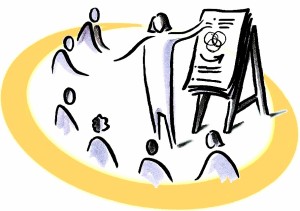At times, leaders can benefit greatly by stepping aside from the content of people’s work to facilitate the process. ~Fran Rees
 I’ve been forming an assumption about leaders for some time. My assumption is that effective leaders are really good facilitators. Or said another way, when a leader takes on the role of facilitator they are not giving up their leadership, they are demonstrating their leadership.
I’ve been forming an assumption about leaders for some time. My assumption is that effective leaders are really good facilitators. Or said another way, when a leader takes on the role of facilitator they are not giving up their leadership, they are demonstrating their leadership.
Another consultant put it this way, “The mission of a facilitator and of a leader is the same: Get a group of people to form as a team, set goals, and work together to achieve those goals. Both use the same skills. Both require the ability to communicate, understand and embrace diversity, manage conflict, listen, empower the group, build trust, solve problems, and make the group successful.” (MGR Consulting)
Here are a few more perspectives on facilitation:
The process of facilitation is a way of providing leadership without taking the reins.
A facilitator’s job is to get others to assume responsibility and take the lead.
A facilitator contributes structure and process to interactions so groups are able to function effectively and make high-quality decisions.
When I think of leaders I’ve known or worked with who have struggled to “lead,” they all have at least one thing in common. They were not effective facilitators. In fact, one individual told me that he always had what he called a “process consultant” working with him. I wasn’t familiar with the term process consultant, but now I believe he was referring to a facilitator who was there to manage the process. Such as format, methods, procedures, tools, style of interaction, group dynamics, group norms, group climate, etc.
Needing help in this area from time to time is understandable; especially when the leader wants to be a participant, such as in strategic planning. But someone who nearly always needs a facilitator with them because they lack the skills to create a format and tools to manage group dynamics and interactions; wow, I think it’s a real stretch to call them a leader.
Having content knowledge, alone, limits the effectiveness of a leader. They need to have both content knowledge and facilitation skills. I would even go so far as to suggest that if they have to lack one or the other, I think someone can lead with strong facilitation skills and minimal content knowledge. That’s why you have content experts throughout the organization.
The new leader is a facilitator, not an order giver. ~John Naisbitt